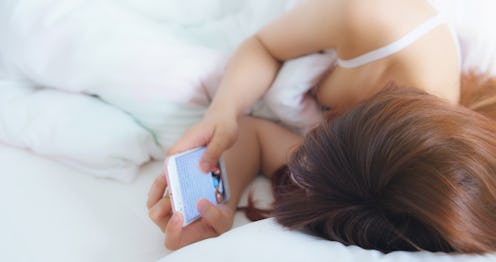Life
We Asked A Therapist To Validate Your Instant Urge To Check Your Phone In The AM

When your alarm goes off first thing in the morning, what’s the first thing you do? Do you get up immediately and start making coffee, like a monster? Or do you, like me, roll over to silence the blaring on your phone's alarm and swipe up, tapping through every app on your home screen for 20 minutes until you’ve sufficiently adjusted to the concept of morning? The latter case — looking at your phone while you wake up — is so common, and such a universally derided bad habit.
Articles on best sleep practices, including on this very website, almost always say never to keep your phone in the bedroom with you, and definitely don’t look at it within 20 minutes of sleep, either at night or in the morning. That, however, is not realistic for the vast majority of us for whom scrolling has become a beloved ritual, even if it messes up our sleep/wake schedules. Further, reading unachievable advice can even make us feel even worse for sabotaging our chances at an optimized day. Imagine, though, that there’s a better way — a vision of the world in which checking your phone first thing in the morning is, actually, good.
My coworker Iman tells me she spends about 15 minutes every morning addressing all the notifications she got overnight, reading the news, and going over her calendar for the day. “I have a lot of trouble starting my day because I fall asleep so late at night,” she tells me over Slack. Checking her phone, she says, “eases me into waking up.”
Dr. Debra Kissen, PhD, CEO of CBT treatment center Light on Anxiety and Anxiety and Depression Association of America (ADAA) member, says that even if using your phone in bed isn’t great for your sleep, there’s still value in a morning ritual.
“There’s nothing wrong necessarily with starting your day with your phone and your emails, but it just often backfires,” Dr. Kissen says. “Say somebody wakes up and starts reading emails. They immediately start feeling stressed, thinking about all the things they have to get done, and then they start their day feeling like they’re already behind. That’s not working.” On the flip side, though, if someone starts off their day reviewing their calendar or notifications and it “helps them feel organized — if they say, ‘OK, I’ve got my plan for what I want to do’, … then that’s working for them,” she says.
The difference between these two use cases often comes down to intention. “One of the ‘dangers’ of using your phone in bed is that it’s kind of an act of procrastination,” Dr. Kissen says. “Your brain can pretend that it’s OK if you’re not getting up yet because you’re ‘accomplishing’ something, but you’re not really accomplishing anything.” Dr. Kissen suggests asking yourself why you reach for your phone in the first place to figure out what your intention may be. “Am I using [my phone] because I don’t feel like getting up, and it’s my way of trying to wake myself up? Is there something else I could do [to wake myself up], or am I tried to be inspired, or learn something new? What am I tried to get out of using my phone?”
The issue with reaching for your phone unconsciously is that, without the guardrail of intention, your brain might grab onto unhelpful or even stressful information. "[Your brain] will create its own intention,” Dr. Kissen says, and come up with something stress-inducing if you don’t make it focus on getting organized for the day, for instance. “Like, ‘I’m going to make you jealous’, ‘I’m going to make you really interested in how dangerous life is’.” (If your brain's habit of focusing its attention on unpleasant or stressful thoughts is distressing for you, the ADAA has resources that can help you unlearn this pattern.)
For me, checking my phone when I first wake up helps me transition from sleep mode to day mode. My partner gets up around 30 minutes earlier than I do, so when I wake up, he’s still puttering around our house in the dash to get out the door; it’s easier for me to stay in bed than wake up with a cup of coffee in the kitchen, where I'd be in his way. I also like seeing what people are posting to their Instagram stories or to Twitter; since I don’t have cable, this is analogous to turning on the news immediately upon waking up. This has been my ritual for the three years we’ve lived together, and it suits me pretty well. That’s the biggest sign, according to Dr. Kissen, that I really can just keep doing what I’m doing — and if your system is working for you, so can you.
Experts
Dr. Debra Kissen, PhD, MHSA, Chief Executive Officer, Light on Anxiety CBT Treatment Center